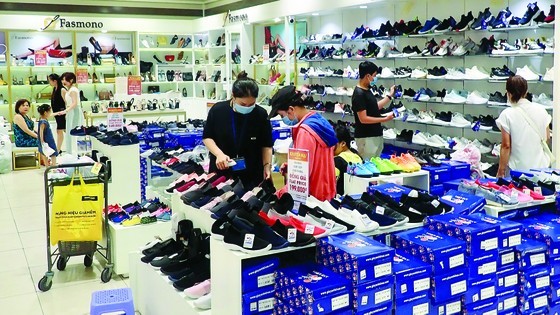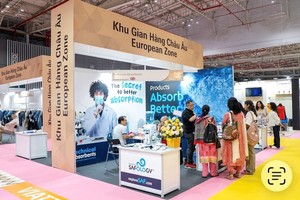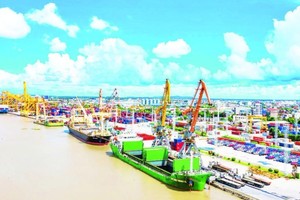 |
The supermarket system of FDI enterprises provides a variety of imported products. |
The Global Minimum Corporate Tax was mentioned and started affecting the investment environment worldwide ten years ago, but it has been brought up a lot in Vietnam recently. We must continue to innovate to attract foreign investors and stabilize and develop the economy.
The era of the "race to the bottom" is over
Foreign direct investment (FDI) plays a significant role in the economy as the FDI sector contributes over 13 percent of the total social investment capital and more than VND78 trillion per year to the budget in Ho Chi Minh City alone. FDI enterprises also account for approximately US$25 billion in imports and exports each year, making up 61 percent of the city's import and export turnover.
One question that arises is whether the FDI attraction of countries will be affected after the global minimum corporate tax is officially applied and whether it will only impact “eagles” - multinational corporations with a total global turnover of over 750 million euros.
"Investors are much more agile and calculated than us," Mr. Phan Duc Hieu, a Standing Member of the Economic Committee of the National Assembly, commented. When this tax was proposed a decade ago, it was likely that investors carefully deliberated on where to allocate their investments. The tax operates on a global and accumulative principle, allowing any country involved in the investment chain to impose taxes up to the global minimum of 15 percent. In other words, if any country persists in providing preferential tax treatment to investors, the country where the corporation is headquartered will still collect taxes. If the country refuses to collect taxes at the minimum level, any country where the corporation has investment activities has the authority to collect the required amount.
The issue lies in Vietnam's heavy reliance on tax and land use fee incentives to attract foreign investment. Typically, every investment project automatically receives four years of tax exemption and nine years of tax reduction or two years of tax exemption and three years of tax reduction. Additional "attached" policies include investing in remote areas or industrial parks and high-tech zones. Taking all incentives into account, some businesses are subject to a tax rate of less than 6 percent per year. Many foreign experts have warned that competing on tax incentives is a 'race to the bottom'. Despite Vietnam's preferential tax rate of 12.3 percent in the ASEAN region, it is still not the lowest. Thailand currently applies a 9.5 percent rate, Singapore is 7 percent, Laos is 10.5 percent, and Indonesia is 11.5 percent. Only Malaysia and the Philippines have preferential tax rates exceeding 15 percent.
As a result, under the global minimum tax rate, if a Singaporean company investing in Vietnam only pays 6 percent tax, Singapore would be entitled to collect the additional 9 percent. Investment enterprises would also forfeit the 6 percent incentive, leading to revenue loss and jeopardizing our competitive edge in attracting FDI capital if we fail to capitalize on this opportunity and innovate our approach.
Opportunity to improve the investment environment
Dr. Do Thien Anh Tuan, from the Fulbright School of Public Policy and Management, suggests that tax policy plays a minimal role in attracting FDI. Other factors such as political stability, wages, size of the domestic market, government support, chain and cluster linkages, and market access have a greater impact on FDI attractiveness. HCMC retains its appeal for FDI due to its strategic location in the region and access to high-quality human resources. However, with limited infrastructure and loose chain and cluster linkages, the possibility of FDI enterprises leaving is very high when there are fluctuations. The tax policy is generally applied, lacks competitiveness, and is not decentralized in terms of tax collection rights. Therefore, it is necessary to change the approach, attract high-quality FDI, create a fair and equal competitive environment, improve the business environment, and promote administrative reform.
In recent years, HCMC has been shifting towards service growth rather than industrial production, reducing labor-intensive industries and increasing high-tech ones. Tax incentives are no longer considered a significant advantage in attracting investment, as support for FDI businesses is now focused on many other aspects. The reality has shown that this is the right direction, and it is essential to strongly improve the investment environment.
Resolving the issue of land shortage
Mr. Hua Quoc Hung, Head of the HCMC Export Processing and Industrial Zones Authority (HEPZA), said the city has a planned industrial land area of nearly 6,000 hectares. However, up to 1,500 hectares are entangled in legal issues or land clearance. In 2023, HEPZA is only allocated 41 hectares of agricultural land for lease, which is scattered throughout the export processing zones and industrial parks instead of being concentrated on a large scale. Therefore, HCMC needs to develop a plan to reorganize its industrial parks and export processing zones, creating conditions for "eagles" to build their nests and improving the quality of FDI.
























